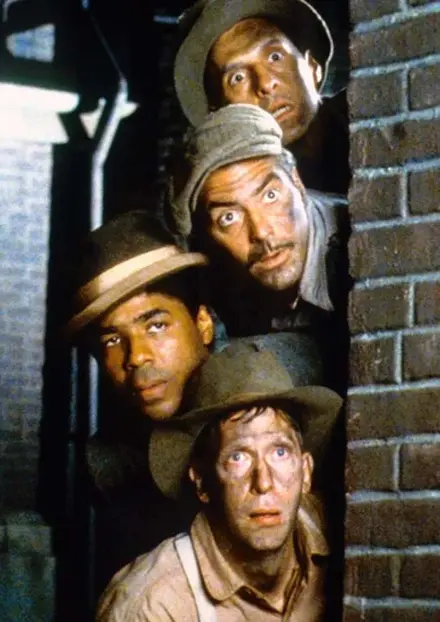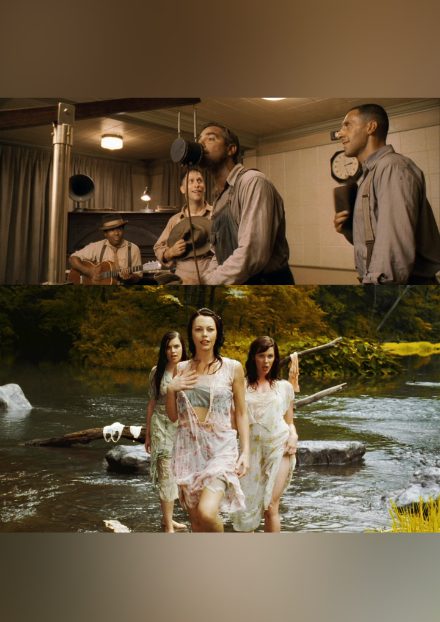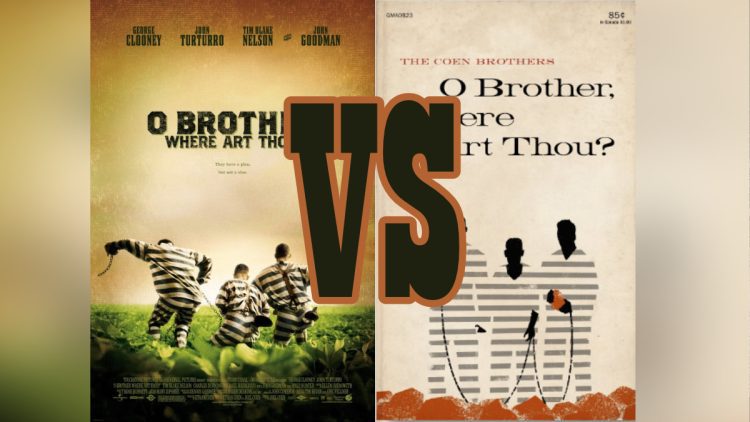In this episode of the podcast Fully Booked, we’re discussing the 2000 Coen Brothers film O Brother, Where Art Thou?, a modern adaptation of the ancient Greek epic poem The Odyssey by Homer. The film stars George Clooney as Ulysses Everett McGill, an escaped convict who persuades his chain-gang companions Delmar and Pete to join him on a madcap adventure across 1930s Mississippi. Under the pretense of retrieving buried treasure from a bank heist, Everett’s true goal is to reconnect with his estranged wife Penny before she remarries.
We learned that the Coen Brothers took the overarching story and character archetypes from The Odyssey and recontextualized them in a Depression-era American South setting filled with distinctive regional music, dialect, and culture. Just as Odysseus encountered mythical beings on his journey home, Everett, Delmar, and Pete face a series of bizarre, comedic misadventures involving encounters with figures representing gods and monsters from Greek lore.

Themes and Characteristics
Related20 Best Classic Literature Books Of All Time
Their string of unfortunate events includes getting drugged and robbed by Sirens, confronting a cyclops-like Bible salesman named Big Dan, evading the relentless pursuit of a Poseidon-esque lawman, stumbling into a Ku Klux Klan rally, and inadvertently achieving fame as the musical act “The Soggy Bottom Boys.” Throughout it all, their dimwitted antics and utter lack of self-awareness provide a humorous counterpoint to the seriousness of the situations they find themselves in.
A major theme is the power of American roots music and its ability to bridge cultural divides, highlighted by the integrated Soggy Bottom Boys’ hit performance that quells a racist politician’s rabble-rousing. We see how Mississippi Governor Pappy O’Daniel, representing a modern Zeus figure, is savvy enough to embrace their appeal to win over the public.
The film deftly balances its zany escapades with sobering commentary on 1930s Southern racial politics, economic hardship, crime, and injustice. However, its overarching tone is one of madcap whimsy and celebration of the region’s rich musical heritage, aided by contributions from acclaimed folk and bluegrass artists on the soundtrack.
Despite their misadventures, at their core Everett, Delmar, and Pete remain haplessly determined fellows bound on an epic journey simply to get home. In updating such an ancient story for the American milieu, the Coens crafted a quirky yet poignant depiction of the struggles everyday people faced during the Great Depression.
We come to understand that while Everett claims noble intentions of regaining his marriage and family, his selfishness and lack of responsibility were likely what broke that bond in the first place. The ending leaves Everett and Penny’s reunion ambiguous, bickering over his inability to find her original wedding ring – a fitting unresolved conclusion as their issues appear to remain unresolved.
RelatedMust-Watch: 10 Great Movies Based on Books

Sticking To The Source
Yet against all odds, through their implausibly cyclical encounters with outlandish strangers and brushes with peril, the trio demonstrate the essence of The Odyssey – the struggle to overcome adversity and return home, wherever or whatever that may be. The Coens took Homer’s epic and rendered it in a wholly unique way while maintaining the story’s thematic core.
In adapting such antique source material so adeptly, O Brother, Where Art Thou? reminds us that the universality of storytelling archetypes can inspire creative, singular iterations across all cultures, times, and places. The film pays homage to the ancient tale by Americanizing it through a distinctly regional aesthetic lens. By grounding the mystical journey in a grimly realistic period setting, the Coens made The Odyssey simultaneously more grounded yet loftily whimsical.
RelatedWhat Are The Benefits Of Reading Classic Literature?
For all its quirky humor and episodic disruptions, at its heart the film charts a timeless personal voyage not just across a landscape but towards an elusive meaning of “home.” That thematic essence resonates whether your odyssey lies along the banks of the Ionian Sea or the winding Mississippi River. Despite not finding the idiotic “treasure” that motivates their initial escapade, Everett, Delmar, and Pete complete a different kind of personal odyssey enlightening them about life’s deeper treasures.
Enjoying this episode? Be sure to check out all of our coverage of the genre over at https://fully-booked.ca/. We’re a listener-supported podcast! Please consider pledging and helping Fully Booked to grow our library over at https://ko-fi.com/fullybooked, or by leaving us a 5-star rating and review wherever you’re listening. Thanks, bookworms, and don’t forget to keep on reading!






















